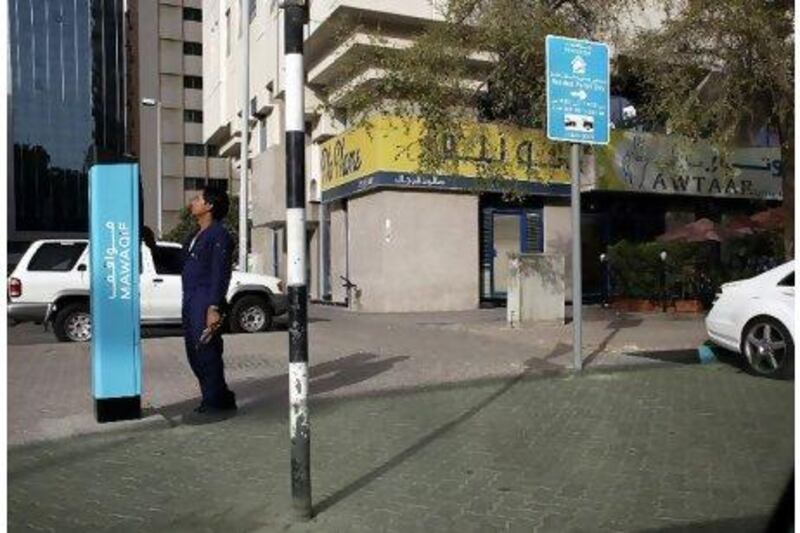ABU DHABI // Frustrated drivers searched in vain for a place to park at the weekend when the Mawaqif paid-parking scheme was activated in one of the most congested areas of the capital.
Many who had paid for a resident's permit - Dh800 for the first vehicle and Dh1,200 for a second - were still forced to drive around in circles until someone else moved.
"Mawaqif should provide more parking spots before they start imposing fines," said Walid Ibrahim, a food delivery driver at the Samurai Japanese restaurant near the Capital Hotel.
Paid parking was activated at the weekend in his part of the Tourist Club area, bounded by Mina, Electra, Tenth and Salam streets, with a total of 3,792 bays.
He has a permit, but it is of no use when there is nowhere to park. "Residents return home from work in the evening so it's hard to get a parking spot after 9pm. One of the residents told me today, 'What will we do? Where will we park?'"
The Department of Transport plans 10 new multistorey car parks, but cannot say when they will be built.
Ashraf Puthinvettil, 45, a sales manager who has lived on the same block for seven years, was happy to see so many empty spots this weekend. "Before, you saw so many double-parked cars," he said. "But I'm not sure if I'll get a spot after 10pm tonight."
Sammy, 72, a Yemeni grocer, lives in a part of the Tourist Club where Mawaqif has been operating for a while.
Last Wednesday night it took him an hour to find a spot near home. "It really hurts the pocket," he said. "For every mistake drivers make, they pay a Dh500 fine."
Patrick John, 54, a geologist who has lived in the Emirates Insurance building for eight years, said that while Mawaqif - activated in his area on March 29 - had reduced congestion, it had also dramatically reduced the number of spaces available.
"It is simply not fair for Mawaqif to decrease the amount of space available for parking so drastically, making life so miserable for residents.
"The residents' paid parking permit is a good system and has perhaps limited the number of cars in residential areas in the evening. But any slight benefit for residents is more than offset by the reduction in available parking space."
The only answer, he said, was more spaces.
Suresh Kumar, 46, a public relations officer at Carrefour and a resident of the same area, had to drive around the block three times to get a spot.
Previously, the road outside his building accommodated two informal rows of parked cars along the middle - which meant spaces for far more vehicles.
"There are not enough parking spaces," he said. "On weekdays, it's so tough to get a spot after 7pm. We have wait for 30 to 40 minutes to park."
He reckons each flat in his building has three or four private vehicles. "Where are they supposed to park their cars?"
A 46-year-old procurement manager at an oil company in Abu Dhabi had the same complaint. "I'm paying Dh800 per year for a parking permit but I'm not assured of a spot when I return home from work," he said.
"This area is very crowded and we're forced to take a taxi if we need to go out in the evening."
Extending controlled parking to 8pm would help, says Mr John. "After that, residents may park in any available space as long as they are not causing obstruction.
"Or the scheme could be discontinued through residents' action. I would be interested to know in how many areas Mawaqif has been discontinued following residents' complaints."
The long-term solution is to build multistorey car parks and underground parking in new building projects, he said.
"In the meantime, for the situation to become at least tolerable every viable space should be made available for parking."
Many accepted that Mawaqif has had a positive effect, clearing up the roads by clearing out the lanes of parked cars.
"In a way, it's also good for us," he said. "Before Mawaqif, many resorted to double parking and you couldn't get your car out of the parking area. Now our cars are safe from scratches and dents."
* Additional reporting by Anna Zacharias






